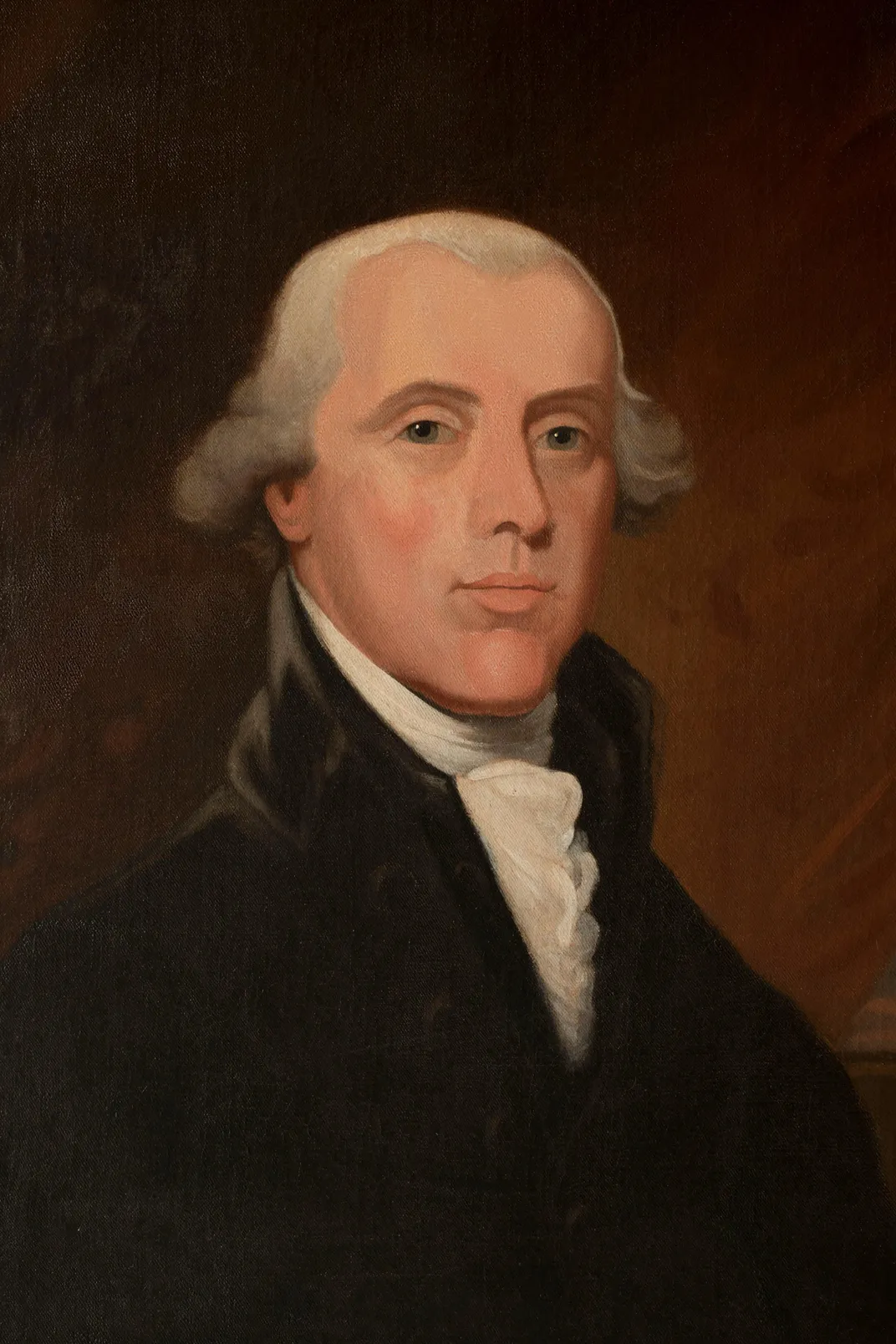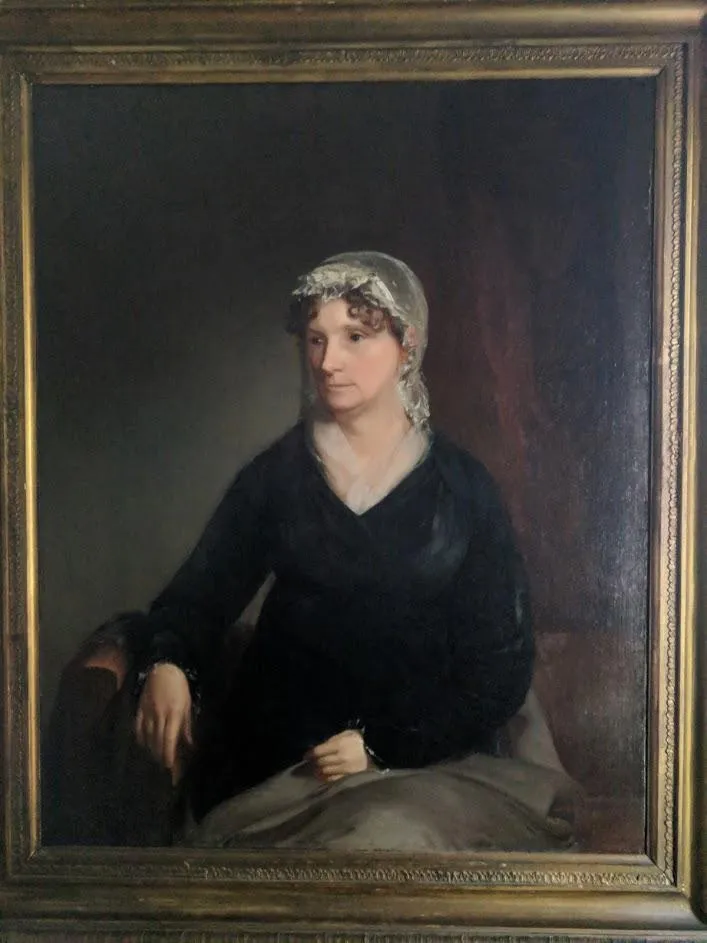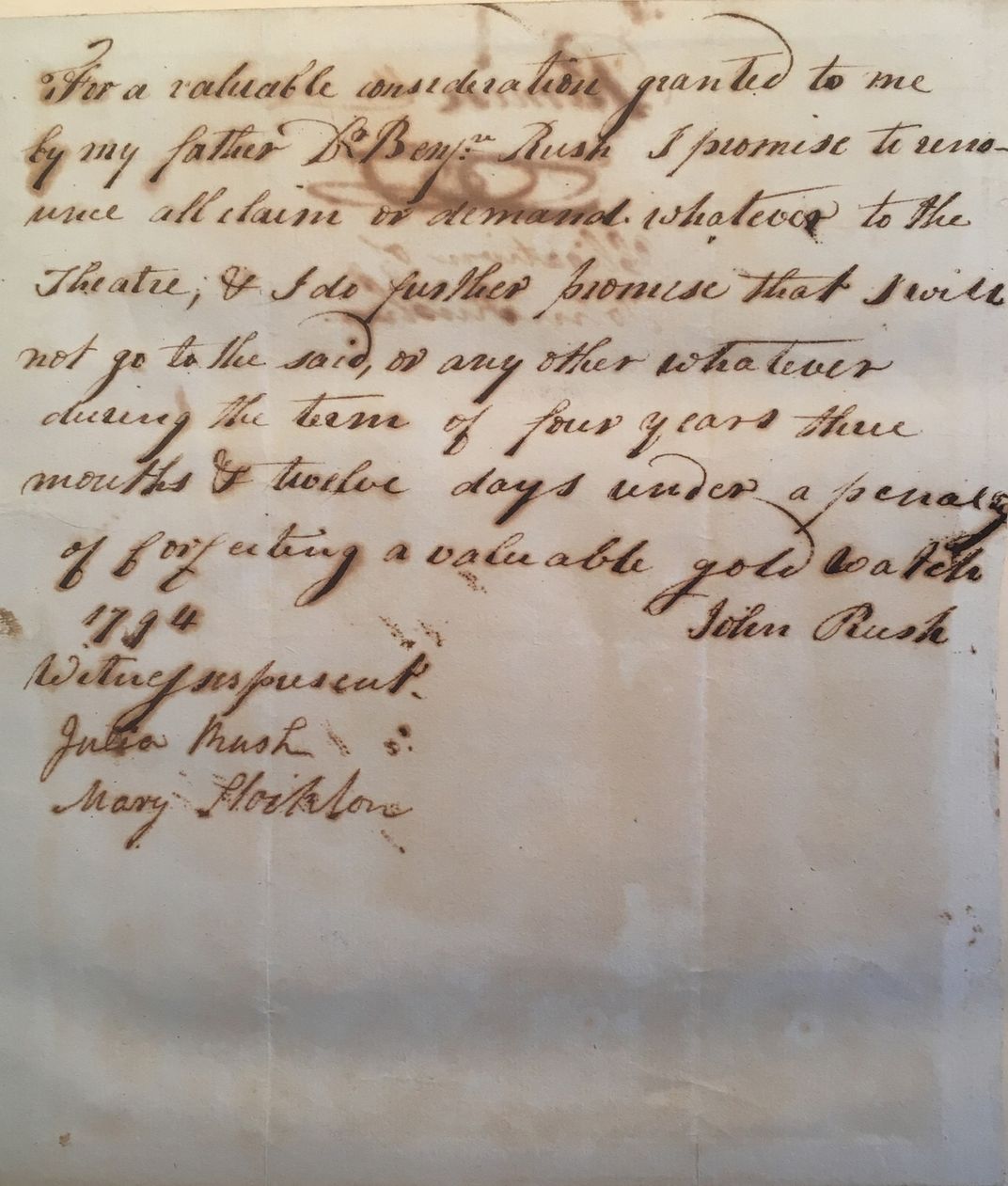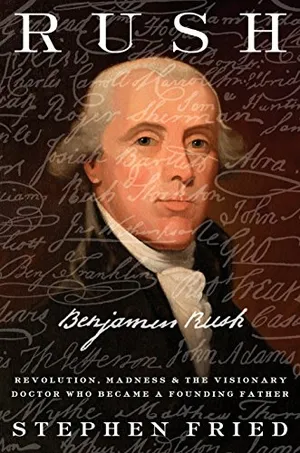Rediscovering a Founding Mother
Just-discovered letters herald the significance of an unsung Revolutionary woman, Julia Rush
:focal(742x669:743x670)/https://tf-cmsv2-smithsonianmag-media.s3.amazonaws.com/filer/d1/18/d11881e9-d1dc-4b34-a74a-22099295d3fc/sep2018_i05_prologue.jpg)
In late January of 1778, the darkest moment of the Revolutionary War, Benjamin Rush wrote to his young wife, Julia: “I thank you for your hint respecting G. Washington, and accept it as a new proof of your affection for me.”
Julia Stockton Rush, who was only 18, had suggested that her brilliant but promiscuously opinionated husband—one of the youngest signers of the Declaration of Independence and now, at 32, surgeon general for the Continental Army’s most active battleground—needed to stop gossiping about George Washington, who was both his commander in chief and his friend. In letters and in conversation, Benjamin was repeating the military backbiting over Washington’s losses the previous year.
In this letter—recently discovered at a small Philadelphia library among a collection of Julia’s longest-hidden correspondence—Rush promised to take her advice. He claimed that so many of the Pennsylvanians in the Continental Congress “speak my sentiments so fully” that he was “satisfied” and would be “silent.” Too late. A disparaging letter in Rush’s hand was making its way into Washington’s camp. The general never forgave him.
And the doctor learned a painful lesson—one he found himself relearning throughout his marriage. “Had I yielded to [your mother’s] advice upon many occasions,” he later wrote to his children, “I should have known less distress from various causes in my journey thro’ life.”
While researching my new book, Rush: Revolution, Madness & the Visionary Doctor Who Became a Founding Father, I managed to track down new and revealing correspondence to, from and about Benjamin, the misunderstood patriot, physician, writer and educator known as the “American Hippocrates.” But one of the biggest surprises was finding unpublished writing by and to Julia. The Rushes’ descendants hid much of the couple’s writing away, partly to shield the unvarnished opinions of Benjamin and his favorite correspondents, Presidents John Adams and Thomas Jefferson, and partly to protect the career prospects of some of their sons. (Their son Richard served four presidents, as attorney general, secretary of the treasury and U.S. representative to Great Britain and France.)
Rush: Revolution, Madness, and Benjamin Rush, the Visionary Doctor Who Became a Founding Father
The remarkable story of Benjamin Rush, medical pioneer and one of our nation’s most provocative and unsung Founding Fathers.
Julia herself chose to burn many letters because they were “fit for scarcely any eyes.” So she has been known primarily through a “devotional journal” filled with mournful prayers and doleful observations about her husband’s death, which gave the impression that she wasn’t a very interesting writer—or person. But the new correspondence reveals her as a vastly underappreciated Revolutionary woman who had influence and opinions of her own and was very much at the center of events during and after the struggle for independence.
Julia Stockton Rush was born on March 2, 1759, in Princeton, New Jersey, the first of six children of the lawyer Richard Stockton (whose family donated part of the land for the College of New Jersey, now Princeton University, where he was a trustee) and the Philadelphia-born writer Annis Boudinot Stockton. Like her mother, Julia had porcelain skin, a high forehead, searing dark eyes and a Mona Lisa half-smile. She was well read and a gifted singer, and she grew up with strong female role models, especially her mother, who was one of the first female poet published in the United States.*
Benjamin Rush began courting Julia in the summer of 1775. He was 29 and a rising physician and patriot in Philadelphia. She was a 16-year-old heiress living on a Princeton estate called Morven. In a courting letter from Benjamin, who was raised by a working single mother, he imagined her role in their marriage: “If the business of a married woman’s life consisted simply in receiving & paying visits—in providing food for a family—or in bringing a number of children into the world, I should pity you in entering so early into matrimony. But I know you have higher objects principally in view.” As an engagement gift, he built her a library in his home and stocked it with the first hundred volumes he hoped she would read and they could discuss.
They married in January 1776, and within months both Julia’s husband and her father had been elected to the Second Continental Congress. On August 2, 1776, both signed the Declaration of Independence. That November, her father became the first signer to be captured by the British; he was ill-treated for six weeks and released, clearly a diminished man. While her husband was caring for Washington’s soldiers, Julia relocated to a family estate in Maryland, pregnant for the first time.

Soon after the British vacated Philadelphia, in June 1778, Julia and her infant son, John, reunited with Benjamin, who had resigned as surgeon general in a dispute over patient care. While he was burned out from politics, she became more involved, joining a small group of prominent wives, including Martha Washington, to raise money for the troops. “My dear wife,” Benjamin wrote to Adams, “who you know in the beginning of the war had all the timidity of her sex as to the issue of the war...distinguished herself by her zeal and address and is now so thoroughly enlisted in the cause of her country that she reproaches me.” Julia’s team collected $5,623—more than $100,000 today—from 74 donors in June 1780.
As the Rushes built their lives together in an uncertain world, child-rearing took over much of her time. Between January 1779 and May 1801, Julia gave birth 12 more times. Four of the children died in infancy, twice in devastating succession: She lost infant daughters in 1782 and ’83, and infant sons in late 1787 and ’89. Also, she nearly lost her husband, in 1786 and ’88, from diseases most likely caught from his patients. But Julia was strong, and she maintained a sense of humor about the challenges he put his family through.
In the mid-1780s, when Benjamin started writing for the first American magazines and saw that lists were an effective way of making commentary, Julia composed “A List of my husband Dr. Rush’s faults kept by me Julia Rush,” which begins:
He is too passionate
He is too impatient in health and too peevish in sickness
He suffers his servants to do as they please
He gives too little attention to his children
He spends most of his evenings from home in political club
He suffers every body to cheat him that he deals with
He neglects to collect his debts, except when pressed by necessity
As they raised their children, they hewed to the intellectual lives they had as newlyweds. In the summer of 1787, he wrote that “I long to put” a new book on moral philosophy “into your hands. I enjoy it only by halves from not reading it with you. I wish you to make yourself mistress of it. It will qualify you above all things to educate our children properly.” She and her mother often wrote to each other about books and ideas. In 1793, Annis sent a missive on Mary Wollstonecraft’s recent book A Vindication of the Rights of Women, which she knew Julia had already read. Annis believed the book’s message was more crucial in Europe because—at least from her vantage as a wealthy widow—American “women have their equal right of everything.” Julia, living in the city with a house full of kids, probably saw things differently.

Late that summer, she and Benjamin faced their greatest challenge—the yellow fever epidemic in Philadelphia, during which she and their children repaired to Morven while he turned their Philadelphia house into a makeshift ward. On September 22, she wrote to her husband knowing it might be their last communication. “My dear Dr. Rush,” she wrote, in a recently discovered letter, one of eight new documents from this fraught period, “I have endeavored to keep up my spirits thru the whole of this great calamity with which we are visited and my friends all say I have done it wonderfully—but your two last letters have been almost too much for me.”
Those “two last letters” reported the deaths of many of their friends and neighbors. In their own home, one apprentice had already died and several others were infected, including Benjamin’s sister. “If you get sick again yourself,” Julia continued, “which I very much fear, what shall I do when I come to you, with the house full of sick men.” Still, she did not insist he flee, as many other physicians had.
As the epidemic burned on, however, Benjamin became controversial in Philadelphia—the few remaining physicians were battling over treatment methods (for a disease that is still untreatable), and some felt Rush’s “heroic” doses of the standard purging and bleeding were too extreme. In another letter, Julia noted, “There is great sympathy in New York in your sufferings”; a friend of hers said that he was “all but prayed for by name in most of the churches.”
Once the epidemic was over, the Rushes turned their attention to their children, especially John. At 15, he got into trouble as a student at the College of New Jersey for gambling on the Sabbath and was brought home to continue his education. Two years later, in 1794, his behavior led his parents to make him sign a pledge not to attend or participate in the theater (which some clergy thought was damaging to the morals) until he had turned 21—at the risk of losing part of his inheritance.
“I promise to renounce,” John wrote, “all claim or demand whatsoever to the Theatre, & I do further promise that I will not go to the said...under a penalty forfeiting a valuable gold watch.” After he signed the pledge, Julia and her sister Mary witnessed it.
After studying medicine for two years with his father, John decided to take his first sea voyage, to Calcutta, as a surgical trainee in 1796. Before he left, both his parents—not just his father—drafted a three-page letter about how he was to behave and arranged for the captain of John’s ship to deliver it to him at sea: “Be sober and vigilant,” they wrote. “Remember at all times that while you are seeing the world, the world will see you....Whenever you are tempted to do an improper thing, fancy that you see your mother and father kneeling before you and imploring you with tears in their eyes to refrain from yielding to the temptation, and assuring you at the same time that your yielding to it will be the means of hurrying them to a premature grave.”

While the U.S. capital was in Philadelphia, from 1790 to 1800, the Rushes often socialized with the Adamses, both at the President’s House and in the Rush home. That relationship came to a clanging halt when Adams lost the presidential election of 1800 and stopped speaking with Jefferson (who beat him) and with their mutual friend Rush. After Adams reconnected five years later, writing Benjamin a letter that began, “It seemeth unto me that you and I ought not to die without saying good-bye,” the resulting flood of letters over the next eight years prompted Julia to say they “corresponded like two young girls about their sweethearts.”
And yet the Rushes’ lives as parents and grandparents were taxing. Two daughters married and moved away. John attempted suicide in New Orleans and was sent home to his father’s care at Pennsylvania Hospital, where Benjamin had become known for his innovative treatments of mental illness and addiction. (John lived there from 1810 until his death, in 1837, at 60.) Favorite son Richard, who married and named his son after Benjamin, left for the new capital city along the Potomac in 1812.
That fall, after Benjamin published the first American volume on mental health and addiction care, Medical Inquiries and Observations upon the Diseases of the Mind, Julia noticed that he didn’t look well. He died a few months later, on April 19, 1813, at the age of 67, of what he believed to be tuberculosis.
Another recently discovered document—a very long letter Julia wrote to Abigail Adams on June 23, 1813—fills in the details John Adams sought. Julia described her husband as spending his last day in a “tranquil and happy state, either sleeping or raising his hands in silent ejaculation, frequently wiping the cold sweat from his face with an handkerchief which he would not let go from his hands.” Then at “seven minutes after five...without a struggle or a groan he took his flight to an happier region.”
Julia was crushed. “Oh my dear Madam,” she wrote, “what an aching heart is left to me, the world appears a dreary waste, where I have but little to do and less to interest me.”
Julia lived another 35 years and was often lonely. On the fifth anniversary of Benjamin’s death, she pulled out some of his love letters to her from 1775 and sewed them into a book—which she then hid away. Her descendants kept it hidden until the late 1970s, when it was quietly donated to a library in Philadelphia. On one page, she wrote that she had burned all the letters she had sent to him, and even some he had sent to her, because they were too personal. But she kept these because “I have daughters,” and it might be important to them, “when both their parents are no more, to know the principles upon which their attachment and friendship was founded.”
*Editor's Note, August 28, 2018: A previous version of this article incorrectly called Annis Boudinot Stockton the “first female poet published in the United States.” In fact, she was one of the first American-born female poets published in the Colonies.
A Note to our Readers
Smithsonian magazine participates in affiliate link advertising programs. If you purchase an item through these links, we receive a commission.
